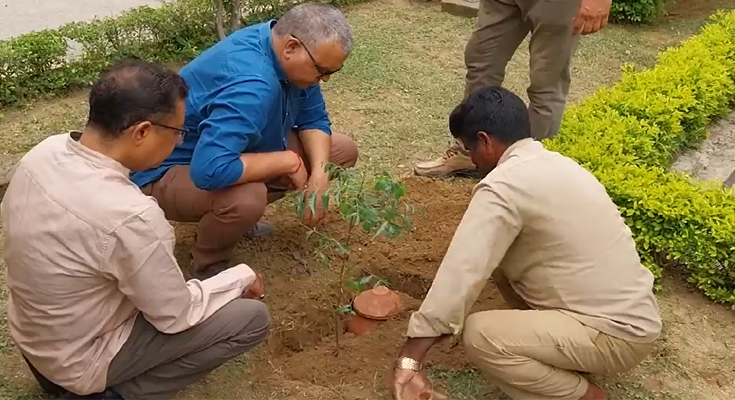Dhanbad: A plantation drive utilizing the environmentally sustainable Matka Plantation Recharge Technique was carried out at Rosaline Hostel of IIT-ISM on Thursday.
The initiative, part of the ongoing ‘Ek Ped Maa Ke Naam’ campaign, saw the participation of Professor Alok Sinha, Head of the Department of Environmental Science & Engineering, Professor Anshumali, along with Dhiraj Kumar, Horticulturist, who briefed students and research scholars about its benefits.
Several Neem saplings (Botanical Name – Azadirachta Indica) were planted during the drive, which forms part of the comprehensive campus-wide initiative. Over 1000 saplings are slated to be planted at Nirsa Campus of IIT-ISM on 13 July, in the presence of Professor Sukumar Mishra, Director, and other dignitaries including Professor Dhiraj Kumar, Deputy Director, Deans, HoDs, faculty members, officers, and staff.
Organized by the Horticulture Section of the Office of Dean (Infrastructure), in collaboration with EIACP (PC-RP) and the Department of Environmental Science & Engineering, the drive aims to raise awareness about environmental conservation and sustainability.
Explaining the Matka Plantation method, faculty members highlighted its advantages over conventional techniques. “In this method, water is filled in earthen pots buried near the roots of trees, allowing water to drip slowly and reach the roots as needed,” said Professor Anshumali.
He emphasized that this technique is particularly effective for areas like mined-out lands, river fronts, degraded forests, hilly terrains, and rainfed agricultural areas.
The Matka Plantation Recharge Technique is not only cost-effective but also contributes to global initiatives like Reducing Emissions from Deforestation and Forest Degradation (REDD+) and India’s Nationally Determined Contributions (NDC), aimed at combating climate change.
Dhiraj Kumar, the Horticulturist, specified that out of the 1000 plants planned for Nirsa, around 400 will be planted using the Matka technique, while the remainder will follow traditional methods.




